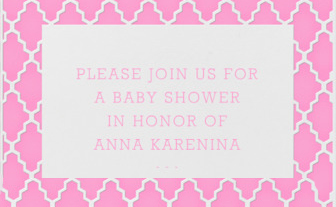
I recently saw an invitation to Anna Karenina’s baby shower. It was not at the library or the Hermitage. It was online at the site of Paperless Post—which, incidentally, might consider changing its name now that they offer the option of paper invitations.
Their incongruous reference to one of my favorite heroines bothered me. I asked myself why, and here is the short answer (for the longer answer, stop reading this and start reading Tolstoy).
Paperless Post typically displays sample invitations of made-up families with preppy names who invite you to celebrate themselves: “Please join the Landford’s for a Baby Shower in honor of Kit & Henry.” The invitations blend together—the homogenous celebration of a self-satisfied society. This is the site’s position: we are the invitations for happy parties! Use our tastefully designed cards and you will have a successful party with beautiful people!
These parties are for people who do not get anxious about going to parties. These people never feel insecure, and never gain weight from eating too much cheese. They have more intelligent conversations and make better romantic decisions after drinking too much bad wine. These people love parties! They have not read Mrs. Dalloway.
Tolstoy says it best in Anna Karenina’s opening line: “Happy families are all alike.” Paperless post is banking on the fact that happy parties are alike too. It’s good marketing. But Tolstoy goes on to say: “every unhappy family is unhappy in its own way.” Paperless Post is not in the business of unhappy—and they are not in the business of individuality, despite the hundred of options to customize your card.
Let me just say I do not hate parties; and Anna Karenina does not hate parties. There are many parties (they call them balls) at the beginning of the novel. Anna glories in them, as do many beautiful women. Parties change her life (break up her marriage); they are undeniably important to the book’s plot. But the Paperless Post invitation breaks the internal logic of Tolstoy’s novel. It is absurd—but not in the good way. It misuses the characters, and is ignorant of the novel’s plot. You have to know the rules to break them. If Dolly lives in Moscow she will not throw a party in Dvortsovaya Naberezhnaya, St. Petersberg. Family calls each other by nicknames: Kitty would invite Anna or the more respectful Anna Arkadievna not Anna Karenina, which sounds unfriendly and legalistic.
The glaring inconsistency is with the character of Anna Karenina. The birth of Anna’s second child (a girl—her first was is the boy Seryozha) is not the time for a party. Anna almost dies giving birth to Annie—the illegitimate child she conceives with her lover Vronsky. She telegrams her estranged husband Karenin: “I beg, I implore you to come. I shall die easier with your forgiveness.” and he goes to her—not sure if her appeal is a trick or the truth, and hoping that she will die because it would simplify his position.
When he sees her, his attitude completely changes. A “glad feeling of love and forgiveness” fills his heart, he kneels down besides her and laying his head in the curve of her arm, which burned him as with fire through the sleeve, he sobbed like a little child.”
Karenin’s change of heart is moving to readers who have been following his and Anna’s unhappy marriage. He goes on to forgive Vronsky. But his Christian forgiveness cannot stand up the ridicule of society. And Anna, when she recovers, finds his saintly manner unbearable. The child, Annie, is mostly forgotten about. Anna never loves her the way she loves her boy. And soon after, she leaves both her children motherless when she commits suicide. It’s not a time to party.
Paperless post should not be discouraged from making literary references—they just need to understand the characters they are playing with. I would love to receive an invitation that reads: “Rey Hahn and Barry Charlus invite you to celebrate Marcel’s coming out. June 28, 1969, Stonewall Inn. New York City.” Ask Frank Hoover in Little Miss Sunshine to decipher that one for you!
✖

